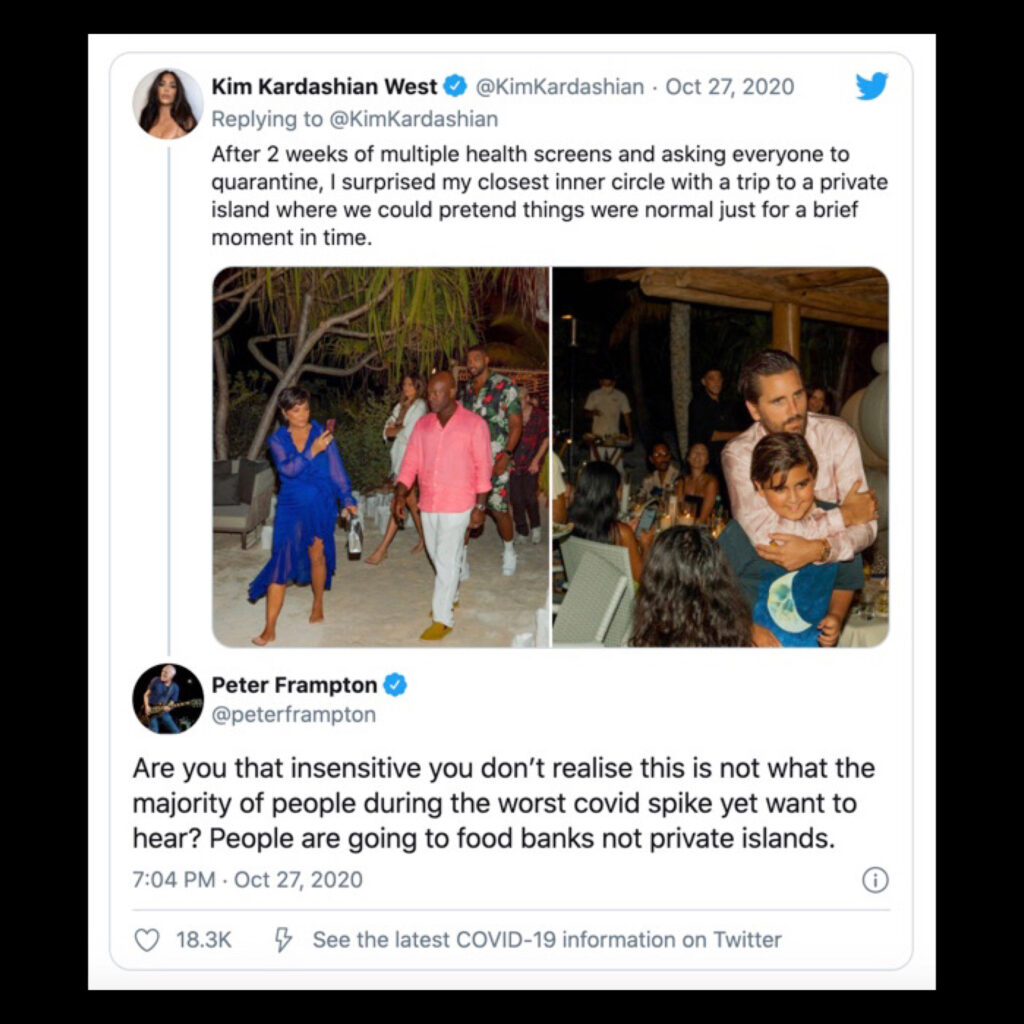Our new research confirms what we suspected; consumers are feeling guilty if they’re financially secure amid COVID-19. What this change in behavior means for brands and advertising.

2020 may go down as one of the most unpredictable years in recent history. There has been so much uncertainty across the board for consumers, influencers, and brands. But in a year where it can feel like everything has turned upside down, one thing is for sure; privilege is out, guilt is in.
We began to see this trend early on in the pandemic with influencers being chastised for coming off as out-of-touch. Arielle Charnas of Something Navy faced harsh criticism for fleeing New York City after her COVID diagnosis. Not only did she flee, but she headed to the Hamptons, a chic beach locale that screams privilege. She lost her deal with Nordstrom in the process. Naomi Davis, another influential New York City blogger, was admonished for potentially spreading COVID while she and her family fled the city in an RV bound for Arizona. (She told her followers they hadn’t been tested for the virus but had quarantined before leaving). A less luxurious escape, but an escape nonetheless and amid soaring death rates at the time. In both cases, the women issued apologies. The latest target for out-of-touch social posts amid a pandemic comes from Kim Kardashian West, who celebrated her 40th birthday on a private island in Tahiti with family and close friends. She faced a swift backlash after posting photos and a caption from the island where she said they could “pretend things were normal just for a brief period of time.”
While these influencers faced criticism for largely being tone deaf, we began noticing a trend among consumers for recognizing their own privilege this summer. Not only were judging influencers, they were also judging themselves. And that trend has continued. With COVID still on the rise and the economy sluggish at best, consumers a who are lucky enough to hold a stable job and have income to spend as they wish are realizing maybe now isn’t the time to flaunt that fact.
We’re not just seeing this in the travel and vacation spaces, either. According to the New York Times, even the traditionally flashy New York City real estate market is toning things down a bit, where the new luxury décor is understated simplicity. Higher-end condos are staging apartments not with over-the-top aspirational furniture and art, but with pieces from Room and Board; aspirational yet attainable for those who can still afford a million-dollar apartment.
For those financially stable consumers, with awareness of their privilege comes guilt. As Sue Peck, a financial advisor in Madison, Wisconsin told the Wall Street Journal, “Some of my clients have expressed feelings of survivor’s guilt, wondering why they are doing so well when others aren’t.”
This guilt is changing consumer behavior across the board. It’s leading to increased donations to food banks and other non-profit organizations. Some consumers are tipping delivery drivers more. For others yet, they’ve switched from being proud of a new purchase to hiding it; not posting about it on social media and not mentioning it to friends in real life.
Our quantitative research confirms this trend. In a Front Row Insights & Strategy survey conducted in October 2020, 67% of Millennials and 65% of Xers told us it feels wrong to purchase luxury items right now because of the pandemic. And this guilt isn’t limited to luxury items; 72% of Millennials and 72% of Xers told us it feels wrong to splurge on things they don’t really need now.
This consumer guilt-trip trend may stick around as long as COVID and the economic fallout from attempting to contain the virus. So, what does that mean for brands? Brands can’t rely on influencers and consumers to share and amplify purchases and hauls as they have in the recent past. Yes, after months of pandemic “disastertizing,” consumers are looking for an emotional release, but not one that takes them back to their pre-pandemic days. Advertising and messaging that deftly navigates this “inconspicuous consumption” trend will be what resonates until we’re on the other side of this pandemic.






